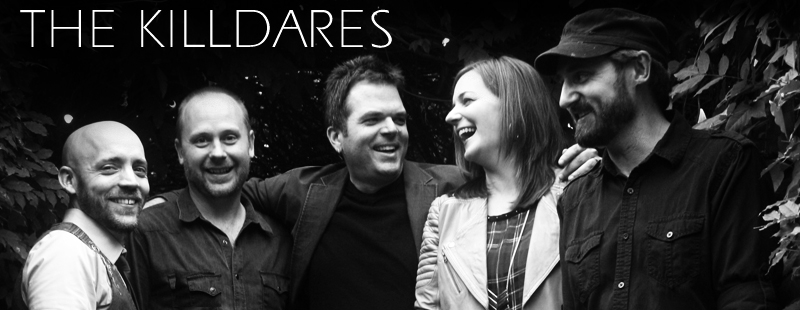On the December cover of BUDDY Magazine
Posted by The Killdares on Dec 12, 2008
Hey everyone! Check out our feature story in this month’s Buddy Magazine. We are honored to be sharing the cover of this Original Texas Music magazine with fellow Dallasites, The Polyphonic Spree! Dallas fans, when you’re out and about Christmas shopping this month, be sure to take a break, grab a copy, and read up. And for everyone else…read the full story below:
Can The Killdares’ Celtic Rock Stop the Murder Virus?
Musical expansionism might save our lives
By Tim Schuller
The Killdares are a Celtic rock band. Their music is excellent but goes beyond that. It embodies an alternative to slaughter.
Most musicians are entertaining bozos. No less and certainly no more. They lack the polytheistic multi-ethicity of Brave Combo or the meta-cross-culturality of jazzman Dennis Gonzalez. Those bands prove societal/ethnic barriers may be sundered sans RPGs. Likewise, the Killdares.
Context: the State Fair. In front of the Hall of State, Texas’ Cultural Partnership presents dance troupes from Lebanon, Turkey, and Puerto Rico. The Afro-Brazilian drum/dance troupe Samba Vida performs, as does Grupo Azteca Teokali (Aztec dancer). This is in a crowd and in any crowd are those who want to off the pol-lice, bomb foreigners, landmine the borders, and nuke whoever has the wrong god.
But when the dance troupes hold forth onlookers smile and sway to the rhythms. They applaud. Uplift rugrats for a better look. Plainly, music and dance are antidotal to the murder virus.
You move to a stage where the Killdares are to play and out they come.
They’re a quintet that plays energizing music with a powerful yet graceful Celtic spin. Roberta Rast plays fiddle and Matt Willis plays bagpipes. Founding member Tim Smith drums and sings in that hearty, declamatory style you associate with Irish singers. Stetson-wearer Jim Dawson plays bass.
The guitarist is Brek Lancaster, who has the best hair of any man alive. Has to be Welsh or Irish, to have hair like that.
Willis reminds you of Irish tough guy McGloin in Gangs of New York.
No Irish roots
But the music has played a visual trick. Everyone’s American-born. (Says something right there. If you can dodge inborn penchants well enough to do an art you’re not groomed for, you can dodge the murder virus.) No one but Smith is Celt by bloodright.
Smith says some interviewers have questioned the Killdares’ “legitimacy” over this.
Sounds like the old “gotta be black to play blues” to this reporter. What crap!
“You’re right, it’s absurd,” agrees Smith. “We get positive regard on our music all the time but some have said because we don’t all have direct Irish roots, it doesn’t legitimize it as much. I think that’s absurd. We’re a group of people who came together in Texas and have been heavily influenced by Celtic music, the history of it, and the instrumentation. It does happen my heritage is Irish, three or four generations ago. My grandfather on my mother’s side, his forebears were the Gannons of county Roscommon.”
(Note to readers: That’s the county from where hails the dreaded Morrigan, phantom queen of Irish mythology.)
Smith was heavily influenced by his parents’ collection of Irish folk music, and “progressive bands from the UK of the ’60s that combined Celtic and rock instrumentation, like Steeleye Span and Fairport Convention. Celtic music gets played with’world beat,’ Cuban rhythms, salsa rhythms. The Chieftains have combined it with, well, you name it.”
Fiddler in the band
It may be that Rast has a more truly kinetic musical connection — and she’s of German heritage! (Well, there’s a jot of Welsh in her.) She grew up in the American fiddle competition arena (and is a rather big gun therein), and Scots/Irish fiddle tenets have been a core of American fiddling since the 1700s.
“I still find out, oh, such and such a song came from Ireland, and think, gosh, I’ve been playng that since I’ve been five years old!” she says.
But, she explains, “The contest style was more difficult. When I first joined this band was when I first really paid attention to what was going on with Irish/Scottish/Cape Breton fiddlers. They add all this ornamentation, they do this ‘shake’ thing like they just got cold and had a shiver. There would be this left hand finger work that’d be really quick, that you couldn’t make out a pitch — it was more of an effect.”
Classical violinists and contest fiddlers go all up and down the neck of their instruments. Celtic players stay low on the neck almost exclusively. There’s difference in bow work, and Rast describes what might be over-simplified as the difference in the exactitude of jazz guitar as compared to the smears and uppercuts of blues. She’s told she “uses a lot of bow for a Celtic player.”
“It’s my fifth year with this band. I love watching audiences interact with us. I think people crave what uplifts them and people I talk to say the shows are a wonderful experience. It’s not just ‘entertainment’ and we’re not really aware of really touching someone, but it does seems to happen. It’s Celtic music mixed with a rock beat you really want to dance to.”
The reporter butts in. His great grandmother was born in Ireland. Blind, living in an attic in Salem, Ohio, she told him Irish secrets he is not wont to share. This was over half a century ago. The Killdares break the time barrier and conjure crystal clear recollections of her.
Return to the Fair. The reporter sees a dainty, elderly lady Middle Eastern garb — couldn’t be further from Celtic roots if she tried — but was plainly enjoying the band. He sees a headline “Killdares Democratize Uzbekistan.” Not such a leap if you think about it.
Enter bagpiper Matt Willis. After dithering with a dozen or so instruments he took up the pipes in his teens and not only plays them, but repairs pipes sent to him “from all over the planet.: He used to stand stock still onstage, in the traditional manner of pipers, but now moves freely about. At the Fair he wore a kilt, and contributed significantly to the visual impact of the band. The full-throated drones and visceral timbre of his pipes, the breakneck pace of the jigs/reels/breakdowns (a breakdown is called a hoedown in Rast’s native Idaho), driven by the hardball force of guitar/bass/drums — it makes for a band with a very long reach.
“We have everybody in our audiences,” says Willis. “Young, old, every ethnicity you can imagine, and they all seem to be digging it. I’m very grateful for that. It’s not something we aim for but, well, a lot of people seem to enjoy it. One of the things I’ve noticed about music, take away the lyrical side away, music in and of itself — it can display the whole range of human emotion but I’ve never heard music that is murderous.”
He says death metal might convey such but that’s mainly the lyrics, and the reporter says even so that stuff’s mainly like monster movies. Trick or treat. Boo.
“Yeh. Without the lyrics, which are poetry set to a beat, it’s really hard for music to convey a negative.” The reporter agrees. We are a species with a history of rejection of true freedom in favored of hackneyed old negatives and archaic suppressions. But, we have choices! They are represented in the joyous crosscultural expansionism of the Killdares.
Their newest CD is Secrets of the Day.
From Dec ’08 BUDDY Magazine







Awesome review, guys! Merry Christmas!!
Like I said when you guys came to Tucson, the Killdares are one of the best shows I’ve ever seen. Your cd’s are in high rotation in our household and car.